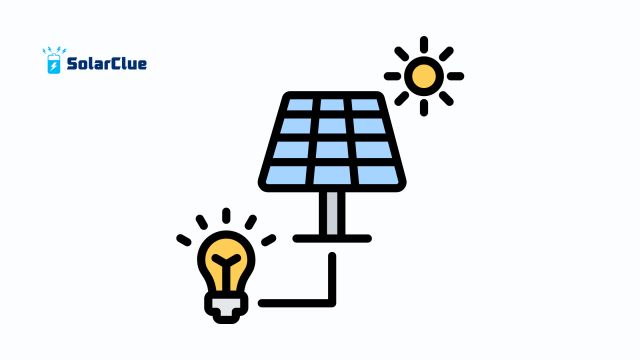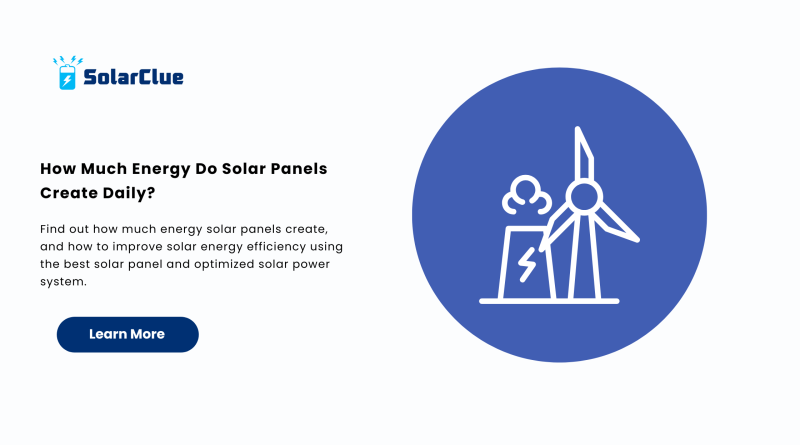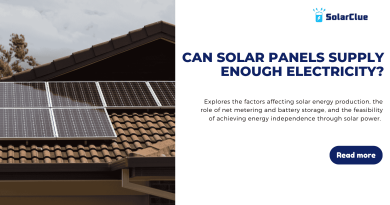How Much Energy Do Solar Panels Create Daily?
The shift towards renewable energy sources has fueled a growing curiosity: how much energy do solar panels create? Whether you’re considering installing a solar panel for home or upgrading an existing solar power system, understanding energy output is crucial. This guide explains the energy production of solar panels and how to maximize solar panel efficiency with the best solar panel.
Table of Contents
- 1 How Do Solar Panels Work?
- 2 How Much Energy Do Solar Panels Create?
- 3 Best Solar Panel for Maximum Output
- 4 How to Maximize Solar Energy Efficiency
- 5 Solar Panel Benefits Beyond Energy Creation
- 6 How to Calculate Your Solar Needs
- 7 Geographic Impact on Solar Energy
- 8 Battery Storage: Store What You Create
- 9 Government Incentives and Rebates
- 10 Real-Life Case Study
- 11 Environmental Benefits
- 12 Future of Solar Panel Efficiency
- 13 FAQs
- 14 Conclusion
How Do Solar Panels Work?
Solar panels convert sunlight into electricity through photovoltaic (PV) cells. The generated electricity can either power your home or be stored in batteries for later use.
Key Factors Influencing Output
- Sunlight Hours: The more sunlight, the more energy.
- Panel Efficiency: Higher efficiency means more power.
- Orientation and Tilt: Proper setup maximizes sunlight capture.
- Temperature: Too much heat can lower efficiency.
How Much Energy Do Solar Panels Create?
On average, a typical residential solar panel generates about 250 to 400 watts per hour. Over the course of a sunny day, this equates to 1 to 4 kWh per panel.
Daily and Monthly Output
For a standard 5kW solar power system:
- Daily: 20-25 kWh
- Monthly: 600-750 kWh
- Yearly: 7,200-9,000 kWh
These numbers vary based on geographic location, panel orientation, and system size.
Best Solar Panel for Maximum Output
Choosing the best solar panel can significantly boost your energy yield. Monocrystalline panels offer the highest solar energy efficiency, often exceeding 20%.
Comparison with Other Types:
- Monocrystalline: 18–23% efficiency
- Polycrystalline: 15–18% efficiency
- Thin-Film: 10–13% efficiency
How to Maximize Solar Energy Efficiency
1. Invest in Quality Panels
Go for premium brands with strong warranties and proven performance.
2. Optimize Installation
Panels should face south (in India) and be tilted at an angle equal to your latitude.
3. Regular Cleaning and Maintenance
Clean your panels regularly to remove dirt and ensure unobstructed light absorption.
4. Use Monitoring Tools
Real-time tools help you track performance and quickly spot issues.
Solar Panel Benefits Beyond Energy Creation

Installing a solar panel for home provides more than just energy. It also:
- Reduces electricity bills
- Increases property value
- Contributes to environmental sustainability
How to Calculate Your Solar Needs
Use this simple formula: Daily energy usage (kWh) / average sunlight hours = system size required (kW)
You can find calculators on sites like solarclue.com to estimate your specific needs.
Geographic Impact on Solar Energy
In India, cities like Jaipur, Bangalore, and Chennai receive higher sunlight hours, resulting in more energy output.
Battery Storage: Store What You Create
To make full use of generated energy, install a battery storage unit. It ensures power availability during nights and outages.
Government Incentives and Rebates
Subsidies can cover up to 40% of installation costs for residential solar panel systems. For more details, visit blog.solarclue.com.
Real-Life Case Study
A 3BHK household in Delhi installed a 5kW system and now produces 24 kWh per day, covering 90% of their electricity needs.
Environmental Benefits
Every kWh of solar energy generated reduces greenhouse gas emissions by 0.7 kg. Over a year, a single system can offset up to 6.5 tons of CO2.
Future of Solar Panel Efficiency
With advancements in bifacial panels, tandem cells, and smart inverters, the next generation of solar panel systems will be more efficient and affordable.
FAQs
1. Can solar panels power a whole house?
Yes, if your system is appropriately sized to meet your home’s energy needs.
2. Do solar panels work during cloudy days?
Yes, but energy production will be lower than on sunny days.
3. How long do solar panels last?
Most panels come with a 25-year warranty and can last over 30 years.
4. Is solar power cost-effective?
Absolutely. It provides long-term savings on electricity bills.
5. What happens if I generate more energy than I use?
You can sell it back to the grid through net metering policies.
Conclusion
So, how much energy do solar panels create? A lot—if installed and maintained properly. Whether you want to reduce your bills or live sustainably, solar energy is a smart choice. Curious about the best options? Explore the possibilities at solarclue.com or get expert insights at blog.solarclue.com.



